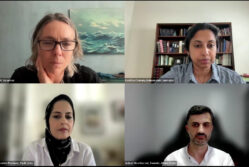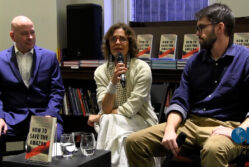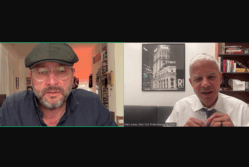Event Coverage Highlight

Report Tracks ‘Increasing Pressure’ on Foreign Journalists in China
A new report from PEN America sheds new light on China’s campaign to silence critics and shut down free expression. The report, “Darkened Screen,” collected input from authors, dissidents, lawyers and more than three dozen foreign journalists working in China.
On Sept. 22, the OPC, along with PEN and Freedom House, co-sponsored a forum to launch and discuss the report. PEN’s executive director, Suzanne Nossel, said amid the country’s ongoing crackdown on domestic media, foreign journalists are playing an increasingly critical role in providing perspective for readers abroad as well as Chinese readers.
But that has spurred China to increase pressure on foreign media, including “more direct and menacing tactics, including harassment of journalists and their families, direct threats made to journalists sitting in rooms with Chinese officials and being told what to write about and what not to write about,” Nossel said.
Some Western media companies have responded by restricting their scope of coverage, Nossel said, and the government has been successfully discrediting foreign media among Chinese citizens.
The panel’s moderator, OPC governor Minky Worden of Human Rights Watch, added that during a recent crackdown in the village of Wukan in Guangdong province, police even placed a “bounty” of $3,000 on foreign journalists.
Barbara Demick, formerly of the Los Angeles Times in Beijing, now at the Council on Foreign Relations, said that despite these strong-arm tactics, she does not believe foreign journalists are softening their coverage.
“I can’t think of a single case of a reporter who pulled their punches for fear of getting in trouble with the government,” she said.
Gady Epstein, media editor of The Economist who was previously the Beijing bureau chief for the magazine, along with Forbes and the Baltimore Sun, said while the Chinese government has always blocked foreign media websites in response to critical reporting, tactics are escalating as information becomes harder to control.
“The new twist is that this information spreads so easily within the Chinese public – there’s social media, there’s an ability for something to spread virally before it gets blocked instantaneously, so there’s a lot more fear of breaking news by Western organizations.”
The good news, he said, is that the crackdown is in part a response to more aggressive investigative reporting from Western journalists.
Widespread availability of camera phones and video has also made stories much harder to suppress than before.
“A riot that gets suppressed in 2005 might just disappear. Maybe reporters hear rumors about it, even if dozens were killed, you’re not able to prove it. Now that kind of thing happens, and there’s going to be some images of it, maybe tweets before it gets censored,” Epstein added.
Edward Wong, the Beijing bureau chief for The New York Times, said that starting in 2012, foreign media started increasing reports on elite politics, which filtered back to Chinese citizens and sparked unrest. He cited stories from Bloomberg and the Times about the wealth of Xi Jinping’s family. Meanwhile China also saw the effects of social media during the Green Revolution in Iran and the Arab Spring as well as turmoil in Ukraine and former Soviet Union states.
“They see an increasing amount of information that flows from the foreign media to people within China and they want to control that information, especially as new organizations open up more Chinese-language products or websites or apps.”
You can download and read the PEN America report via this link >>



